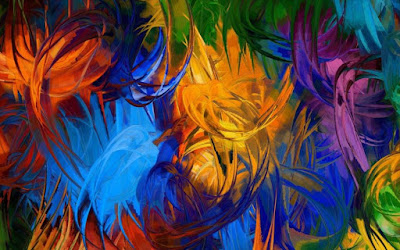I splatter some wet crimson turmoil
unevenly on an ochre morning
A dab of burnt sienna passion
merges with a cobalt violet evening
I mix a few drops of blue black madness
onto a wide expanse of indigo night
Layering iridescent white streaks of emotions
to add texture to charcoal grey senses
 |
| Source: www.wallpaperbetter.com |
I apply a glazing of matted gold
to make raw umber wishes look luminous
Vivid patterns of acrylic emotions
transform rapidly under my hands
colors of feelings words of hues
shades of people brushes of dreams
All blend together on my canvas
a vibrant swirling painting
always alive
always changing
 |
| Source: www.amazingwallpaperz.com |
I have recently developed a fascination for the abstract art form and the various techniques of acrylic painting such as layering, flicking, dabbing and glazing. I have also become familiar with the various shades of acrylic colors that exist and how they can be blended and transformed into something which is almost violent to look at yet strangely soothing. I realized how a painting can portray the same depth and complexity of emotions that a poem can and how it can help us express some of the turbulent emotions raging within us. Out of these thoughts was born this poem.
Hey, your new found passion for acrylic painting sounds interesting. You are right in that a painting can often echo the maelstrom of emotions that make our lives messy, yet so incredibly human. And abstract is one of the best ways to convey that complexity. Not only does it allow us to share an experience the way we see it but also gives others the freedom to draw their own interpretations of what we put on canvas. Guess now, along with your poems, we can look forward to seeing some paintings posted on the blog:)
ReplyDeleteI haven't really started painting but hve started appreciating paintings more. I have been admiring the oil painting techniques used by various artists and the emotions they convey in swirls of their brush. You are absolutely correct about why abstract painting fascinates me- it's because of the freedom to interpret them as one chooses to, exactly like one does in case of a poem.
ReplyDelete